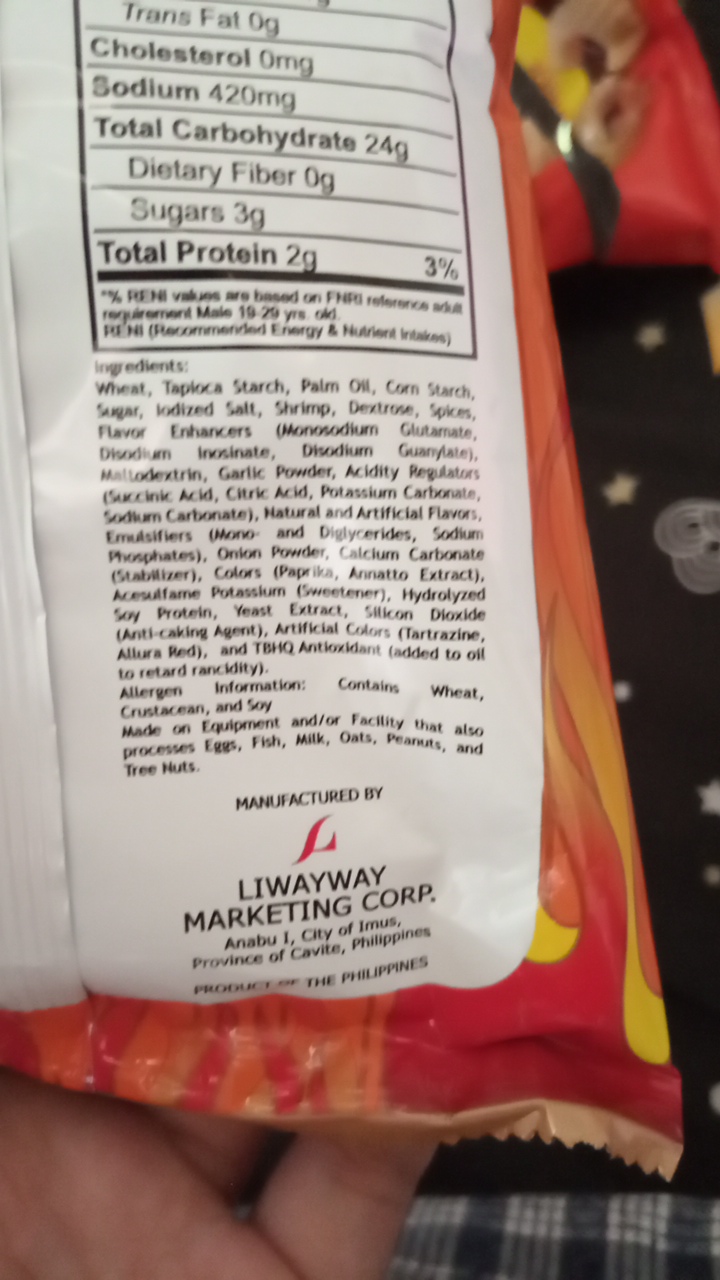
Barcode: 4800194104951
not available
HARAM
📝 Reason: The product contains shrimp, which is considered Haram by some Islamic scholars, making the entire product Haram. Other ingredients are generally considered Halal or their status is doubtful due to unspecified sources. According to Quran 5:3, consuming Haram ingredients is prohibited.
🏷️ Category: Snacks
📄 Certificates: Product Of The Philippines
Ingredients:
Details
Understanding the Halal Status of This Product
The Halal certification of food products is crucial for many consumers, especially those adhering to Islamic dietary laws. In this article, we delve into the Halal status of a popular snack that has raised questions due to its ingredients. This product is categorized as ‘Haram’ primarily because it contains shrimp, which is prohibited for some Muslims according to various interpretations of Islamic law.
What Does Haram Mean?
‘Haram’ translates to ‘forbidden’ in Arabic. According to Islamic teachings, consuming anything Haram is a sin. Quran 5:3 explicitly prohibits the consumption of certain substances, including seafood deemed impure by some scholars. Although some people may have varying opinions on seafood, shrimp is broadly classified as Haram by several authorities in the Muslim community.
Ingredient Breakdown
Let’s take a deeper look into the ingredients found in this product and their respective statuses:
- wheat: This plant-based ingredient is generally considered Halal.
- tapioca starch: Derived from cassava, another plant-based ingredient, and is Halal.
- palm oil: A plant-based oil typically recognized as Halal.
- corn starch: This is derived from corn and is Halal.
- sugar: A plant-based ingredient, usually Halal.
- iodized salt: A mineral-based ingredient that is also Halal.
- shrimp: Considered Haram by many scholars, thus determining the status of this product as Haram.
- dextrose: Sugar sourced from corn is generally Halal.
- spices: Typically plant-based and therefore considered Halal.
- monosodium glutamate (E621): A common food additive that can be Halal unless derived from Haram sources.
- disodium inosinate (E627): This food additive is Halal unless its source is Haram.
- disodium guanylate (E631): Like the previous additives, this is generally Halal unless sourced from Haram.
- maltodextrin: Sugar from corn and considered Halal.
- garlic powder: This plant-based ingredient is Halal.
- succinic acid: An organic acid that is generally Halal.
- citric acid (E330): Common food additive and considered Halal.
- potassium carbonate: Another mineral-based ingredient, typically Halal.
- sodium carbonate: Also mineral-based and frequently Halal.
- natural and artificial flavors: This ingredient can be uncertain, as the source is not specified; could be Halal or Haram.
- mono and diglycerides (E471): Their status depends on whether they are derived from plant or animal sources.
- sodium phosphates (E339): A common additive that is Halal.
- onion powder: A plant-based ingredient, deemed Halal.
- calcium carbonate (E170): Mineral-based and generally Halal.
- paprika: Another plant-based ingredient considered Halal.
- annatto extract (E160b): A plant-based colorant, typically considered Halal.
- acesulfame potassium (E950): This artificial sweetener is generally Halal.
- hydrolyzed soy protein: Derived from soy, considered Halal.
- yeast extract: A Halal ingredient sourced from yeast.
- silicon dioxide (E551): Mineral-based and usually Halal.
- tartrazine (E102): Generally recognized as Halal.
- allura red (E129): Also recognized as Halal.
- TBHQ antioxidant (E319): Synthetic and typically Halal.
Conclusion
In summary, while many of the components of this snack are Halal, the presence of shrimp eliminates its Halal status, rendering the entire product Haram. Those who adhere to dietary laws should avoid this product to maintain compliance with their beliefs. It’s crucial to check the ingredients of products and their sources, especially when looking for Halal options.
By understanding the ingredients and their statuses, consumers can make more informed decisions aimed at adhering to their dietary needs and religious beliefs.
